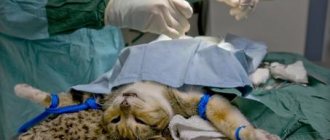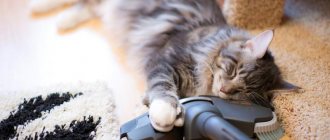Is castration necessary?
In European countries, castration has long been considered a common procedure if the cat will not be used for reproduction and continuation of the breed. The reproductive organs are completely removed after the cat reaches puberty. In our country, not everyone still fully understands why pets are castrated. Many people think that this is abuse of animals, so they regret subjecting them to a painful procedure.
What are the advantages of castration:
- absence of unwanted offspring;
- the house will not smell of urine, since the animal stops marking its territory;
- the cat does not run away from home in search of a female;
- sleeps at night, and the owners do not hear constant screams;
- A castrated cat has less risk of contracting infectious diseases;
- life expectancy increases by 2-3 years.
In order for the operation to proceed without complications, it is important to know when it is best to castrate a cat. Veterinarians recommend an age of 7 to 9 months for castration of a cat. This is the period when the reproductive system has just matured and the animal does not know what mating with a cat is. It is at this sexually mature age that the pet will more easily endure the changes that will occur after castration.
Find out more about the indications and contraindications for cat castration surgery.
Fasting before surgery
Many people are concerned about the question of what needs to be done for castration to be successful and how castration of cats is carried out. As mentioned above, the animal must be in good health. Observe whether your cat has a good appetite and regular normal bowel movements. If you have doubts in this regard, it is best to take your pet to a veterinarian to make sure whether he can undergo such a procedure. All recommended vaccinations must also be completed and the cat must be wormed.
The last step in preparing a cat for surgery is hunger. This must be done on the day on which such an event is planned. Approximately eleven hours in advance, it is necessary to exclude all food for the kitten. This will help him tolerate the anesthesia well and avoid vomiting.
Don't worry that your pet will remain hungry. Cats are created in such a way that they can easily go without food for 24 hours. And even if there is no food for two or three days, this will not affect their mental, emotional or physical well-being. However, a cat can drink, so you shouldn’t deny your pet water.
You can castrate a kitten either in a veterinary clinic or at home. In this matter, you need to weigh everything and find out more detailed information. From this article, it is clear that you need to carefully approach the preparation of your pet for such an operation. Do not neglect these tips under any circumstances.
How to prepare a cat for castration
The operation to remove the testes is considered one of the simplest surgical procedures in animals. However, not every owner knows how to prepare a cat for castration. You don’t have to do anything difficult, you just need to follow a few recommendations given by the doctor.
So, how to prepare before surgery:
- Observe the animal's appetite. The cat must eat with appetite. What to do if you are obese or, conversely, malnourished? Such symptoms may be contraindications for surgery, so you need to inform your doctor.
- Do not give any food 12 hours before castration. Hunger before surgery is an important point, because recovery from anesthesia is accompanied by reflex vomiting, and lumps of food from the stomach can enter the respiratory tract.
- Pay attention to the general preoperative condition of the pet. The cat should look cheerful, active and healthy.
- The cat must be vaccinated. If you have not been vaccinated before, you still need to do it and wait a little until the animal gets stronger and the body restores the functioning of the immune system.
- Treatment of worms is an important point before surgery. Therefore, beware of worms. It is recommended to carry out deworming 10 days before surgery. For this you can use Drontal or Milbemax.
Before castration, water can be given to drink as usual.
Post-operative care
After your pet has been neutered, you need to give him special attention and care. After anesthesia, the animal may experience nausea, thirst, dizziness and muscle weakness. Be sure to measure his temperature and monitor any changes during the first 24 hours.
How to care for a cat after castration:
- Treat the post-operative area daily. To do this, you can use brilliant green, miramistin or chlorhexidine. Sometimes your veterinarian may prescribe antibiotics to help prevent infection.
- Avoid scratching and licking the scrotum. If this cannot be prevented, then you can put on a baby diaper by cutting a hole for the tail. It's even better to wear a collar. This will allow the wound to breathe and speed up healing.
- Clean the litter box daily. The cat litter box should be located not far from the animal’s resting place, since the pet will be weak and a little disoriented at first.
- Make the lounger soft and comfortable. The first hours after anesthesia the cat may feel cold. It is best if the place to rest is somewhere under the radiator, away from drafts.
- The operation affects the animal’s well-being, so for the first 2-3 days the animal will need complete rest and good sleep.
- Provide a balanced diet. Portions should be small so as not to overload the digestive system. Give boiled meat, dairy products, dry food (they contain a lot of vitamins and microelements). You can feed your pet for the first time when the animal has completely recovered from anesthesia. Depending on the individual characteristics of the body, this time is 4-12 hours.
Important! If the cat refuses water and food for a long time, and also becomes lethargic and constantly sleeps, then you need to seek advice from a veterinarian.
Basically, castration takes place without any consequences, but there are cases when some problems may arise.
Complications after surgery:
- infection of wounds;
- internal bleeding;
- severe continuous vomiting;
- hormonal imbalance (obesity).
READ Features of keeping a lemur at home
In addition, there may be malaise, swelling of the lips, irregular heart rhythm, difficulty breathing, and changes in temperature. All this is not fatal, the main thing is to inform the doctor in time.
Author and presenter of the column: Veterinarian Igor Viktorovich Sanaev
Do you want to know more about the article or something? Call 79774692712, we will advise you.
For the first 2–4 days, the wound remains swollen and painful, and must be periodically treated with an antiseptic. On days 5–7, the site of intervention ceases to bother the animal. At this time, it is advisable to stop attempts to lick the defect by putting an Elizabethan collar on the cat. After each cat approaches the tray, it is necessary to clean it of excrement to avoid infection of the wound.
6 hours after the operation, the cat’s appetite awakens. For some time he will eat a little, but often. Regardless of what the cat ate before castration, it is advisable to switch it to premium wet food for the first 2-3 weeks, subsequently replacing it with cheaper dry food. The popular food Purina Pro Plan has a moderate price, which is on average 2.3 times higher than the budget food of the same weight of the Whiskas brand, and Kitiket – 3.7 times.
Carrying out the operation
On the day of the operation, the main thing is not to be nervous, because animals sense a person’s mood and can adopt it for themselves. Before castration, the doctor will examine the cat and take its temperature. If everything is normal with health, then anesthesia is administered and instruments are prepared while the animal falls asleep.
Stages of the operation:
- The first step is to prepare the surgical site of the body. The fur is trimmed and shaved.
- An antiseptic solution is applied to the scrotum. Such treatment will protect against infection.
- Using a scalpel, the surgeon makes small incisions in the area to be operated on. The skin is cut in two places.
- The vas deferens are tied with special strong threads. This will prevent bleeding.
- The testes are removed from the scrotum one by one.
- The incisions are sutured. However, most often postoperative sutures are not made, since the incisions heal quickly and independently, and also to avoid licking of the sutures and injury to the scrotum. This is due to the fact that cats have good tissue regeneration.
The duration of the surgical operation varies from 10 to 20 minutes. After the procedure, the doctor will ask you to wait until you recover from anesthesia in the hospital. But this is at the discretion of the owner. Then you can carefully transport the cat home.
Find out also about the features of castrating a cat at home.
Consequences
The consequences of the operation include complications after emasculation, predisposition to diseases, as well as changes in behavior.
During the operation, bleeding may occur, which is eliminated by the surgeon. Primary hemorrhage is less dangerous than secondary hemorrhage, which occurs suddenly, after a few hours, and can cause death from large-scale blood loss. Therefore, the animal owner needs to maintain contact with the operating veterinarian.
Most often, the problem arises when castrating an elderly patient using the open method. But even in young cats, due to a congenital anomaly, the inguinal rings may be too wide, the vaginal membrane, the stump of the vas deferens, intestinal loops or omentum fall out. The pathology is corrected surgically.
Wound infection
The infection is caused by a cat scratching or licking the wound surface. For protection, a blanket is put on the body of the operated animal. To prevent the cat from licking itself, an Elizabethan collar is used. The cat litter box is cleaned of feces twice a day.
READ What to feed a Scottish cat after castration. What to feed a British cat after castration: diet and feeding frequency
For emasculated cats, two metabolic pathologies are characteristic - urolithiasis (urothiasis), as well as obesity and its consequences.
The disease occurs as a result of drinking poor-quality water, but more often due to poor nutrition. Economy-grade feed, fish, and meat trimmings lead to an excess of nitrogenous components. They are toxic, and the cat’s body eliminates them in the form of sparingly soluble uric acid salts. When precipitated, stones are formed, creating obstacles to the outflow of urine. Mostly males suffer due to the tortuosity of the urethral meatus.
After emasculation, the cat's body continues to grow, but the lumen of the urethra, the development of which is influenced by androgens, remains unchanged. This is the main cause of the disease. You can prevent urotiliasis by using soft, preferably bottled, water, as well as food for castrated animals. You cannot treat your pet to fish, meat or human food.
Very fat cat
Obesity
Depriving a male of his manhood leads to hormonal modification, which negatively affects mobility. Obesity causes diseases such as:
- cardiac and renal failure;
- urothiasis;
- constipation;
- diabetes;
- arthritis;
- malignant neoplasms.
You can get rid of excess weight by limiting the amount of food, as well as by arranging active games. The apartment should have toys - “tall tree”,
"Tall tree"
House for a cat, teasers, game tracks, wind-up mice, etc.
House for a cat
Be gone worms!
In general, it is necessary to get rid of worms (as well as fleas and ticks) once every three months. This requirement is mandatory for those who want their cat to look not only beautiful, but also to be healthy. In general, the animal should be wormed at least once every six months.
If you were given anti-parasite pills for at least a month before surgery, you do not need to do this again. Well, if such a procedure took place more than a month ago, then ten days before the operation it is necessary to re-treat the animal.
The following drugs are in frequent demand:
- drontal;
- milbemax;
- vacation










